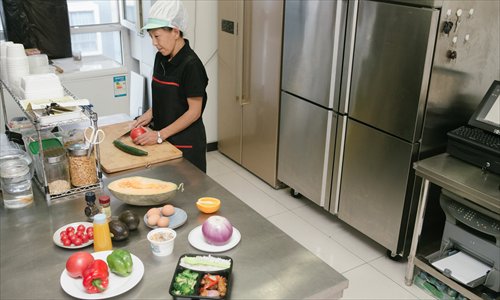
The central kitchen of an online food vendor promoting healthy takeaways in Chaoyang district. (Photo: Li Hao/GT)
Safety concerns
Despite the many options online platforms have given him, Yao said he is still concerned about the quality and safety of the meals, as many online vendors do not own a sit-down restaurant.
One can also not rule out that some reviews and pictures may be fabricated, although in his experience the majority of them are relatively objective.
"The takeaway scene has changed greatly. The food I used to order was at least made by nearby restaurants that I had been to, but now any takeaway vendors even without an actual sit-down restaurant can sell their food online. It makes the market quite unpredictable," said Yao.
According to investigations by the Xinhua News Agency on October 3, even though the new food safety law is in effect, many online vendors still don't have the required licences. The survey found that while the pictures of the food look very good, some food is made in small, dirty spaces.
"On our platform, all the vendors need to upload their business and catering licenses and we do real-name registration offline," said an ele.me publicity staffer surnamed Zhao.
"But there are difficulties in checking the authenticity of their licences. For example, it is difficult to verify fake business licenses. Some vendors use the licenses of other companies."
Wang Yinghui, an independent food critic, told Metropolitan that as the takeaway industry is new and developing fast, the management and supervision by government is not keeping pace with growth in the industry.
"Except for certification issues, there are other problems, too. Some online restaurants do not have a control system such as a central kitchen to ensure the standardization of their meals. Besides, some online reviews or ratings are not objective or have been fabricated, which would affect the judgment of customers," said Wang.
Zhao said that to tackle qualification issues, they have started a pilot project to share data with local supervisory bodies in Shanghai.
Now users in the Lujiazui area for example can not only see the licenses and permits of vendors online, they can also receive government's evaluations about these vendors over food safety issues."
There is still a way to go before the law is effectively implemented, said Wang, but as the market grows, it will naturally wipe out the bad vendors.
Healthier options
Besides focusing on identifying safe and hygienic vendors and restaurants, some diners are also adding a healthy food choice to their list of requirements.
This includes meals that are low in salt and oil using simple cooking methods.
When Joanna Wang, who works in an overseas enterprise in Chaoyang district, gave birth and returned to work, she decided to start ordering more healthy meals.
"Many of my colleagues eat a lot of takeaways like me, but some of them have very low expectations. They don't look for variety and have very simple tastes. I think it is unhealthy. You can still eat a low-calorie, nutritious meal even if it is a takeaway," said Joanna Wang.
She pointed out that there are many online vendors offering healthy food with calorie content and weight in grams being marked on the menu, so you can base your choice on the amount of calories you want to consume a day.
Li Zhonghua, cofounder of HUB Kitchen, an online restaurant that provides takeaways, said that in the past, restaurants mostly played the "convenience and fast" card of the takeaway food they provided. Playing the "healthy food" card is still an emerging concept in China. "But I've found that more people, particularly white collar workers, are choosing healthy meals," he said.
Li Yuanyuan, a Beijing-based nutritionist, advises that those looking for healthy takeaway options should choose light dishes, such as braised eggplant and shredded pork with garlic sauce.
"Complex cooking may damage the nutrients and many spices can easily mask the freshness," said Li Yuanyuan.
She added that for fear of some takeaway food not containing enough nutrients, diners can use foods like yoghurt or peanuts to make up for the single nutrients in the takeaways.
As more people pay attention to healthy eating habits, there will be more simply-processed takeaway options which detail the nutrients and calories that they contain, and which offer more diversity, said Li Yuanyuan.
"Except for lodging complaints with online platforms and supervisory bodies, diners can also buy takeaway insurance to safeguard their interests," she said.
"If they become ill or are even hospitalized after eating the takeaway, they can get compensation of at least several hundred yuan from the insurance company."


















































